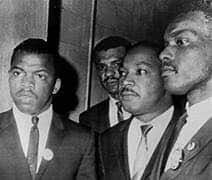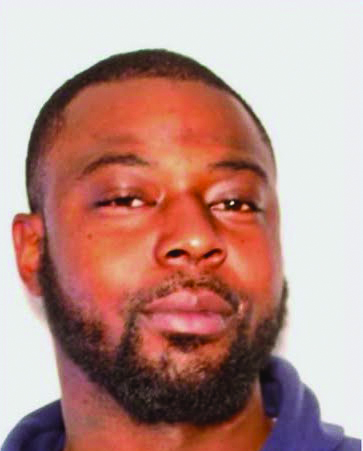Brother and sister recall John Lewis’ visits here
Published 8:11 am Monday, August 3, 2020

- This photo features a young Rep. John Lewis (far right) with other civil rights leaders including Martin Luther King Jr. Larry Lewis is a field officer and the official photographer for the SCLC since the early 1970s. Larry Lewis is a Milledgeville native.
Oscar Davis Jr. and Emily Davis contributed to the civil rights movement in a special way.
Trending
And so did two of their other siblings.
As children, they literally gave up their beds to such famous civil rights icons as Dr. Martin Luther King Jr. and his wife, Coretta, as well as John Robert Lewis, who later rose to become one of the nation’s most beloved and highly respected members of U.S. Congress. Other prominent individuals during the civil rights movement came to their Milledgeville home to visit with their parents and grandparents, too.
Their parents, Oscar Davis Sr. and Geneva Bell Davis, hosted the civil rights leaders at their home on many occasions.
“We never minded giving our beds and rooms for those visitors,” recalled Emily Davis. “Of course, back then as a child, I didn’t really know the importance of these people. I just knew they were important and they were my parents’ close friends.”
At the time, Emily was only 6 or 7.
“Mama and Daddy would tell us that we were going to be spending the weekend with our grandparents when Dr. King and Mr. Lewis, or Dr. Joseph Lowery and others would come to Milledgeville for a visit and eat dinner,” Emily said in a recent interview with The Union-Recorder.
Trending
Her brother, Oscar Davis Jr., who was 15 at the time the civil rights legends visited, said they spent time with his parents and grandparents when they were about to set out on a pilgrimage.
“When they left Atlanta and headed for somewhere else in Georgia, South Carolina or North Carolina, Dr. King and Mr. Lewis would always stop in Milledgeville and spend time at my parents’ home,” said Oscar Jr.
Emily said every time any of the civil rights icons came to visit that she remembered as a child just how much they loved eating fried chicken and all of the fixings that were prepared to go with it.
“My mom is an excellent cook and she still loves cooking today,” said Emily. “She would fix collard greens, homemade biscuits, and all kinds of other dishes of food to go with the fried chicken.”
Emily said her mama would also prepare dessert for her guests.
“She fixed them apple and peach pies, and sometimes my grandmother would bake a cake,” said Emily, noting she had her baby sister, Fran Davis Gordon, who was only a year of two old at the time, would stay at her grandparents’ home. “My younger brother, Dale, would have to stay with them so the guests could spend the night in our rooms.”
Emily said as she grew older, she realized just how important those people were who visited with her parents and grandparents.
Since Oscar Jr. was older, he was able to stay home and got the opportunity to personally meet some of those civil rights legends, such as Lewis.
“I met John Lewis for the first time in late 1964 or early 1965,” recalled Oscar Jr. “I met John Lewis through a gentleman named William “Bro” Humphries, who brought John Lewis to Milledgeville.”
Oscar Jr. said “Bro” lived in Milledgeville and was student at Tennessee State University.
“Bro and John met when they were getting ready to organize SNCC (Student Nonviolent Coordinating Committee),” he said. “They then went all around the state of Georgia getting Black people to join SNCC.”
Oscar Jr. said he distinctly remembered Lewis advocating peaceful, nonviolent marches when he talked with local people about getting involved in the civil rights movement.
Before the march that became known as Bloody Sunday in Selma, Ala., Oscar Jr. said Lewis visited with his parents and grandparents.
“When Bro would come back home, he would bring John and that’s how he met my folks,” said Oscar Jr.
He said Lewis took up a lot of time with one of his grandmothers, Geraldine Bell, a housewife and his mother’s mother.
“He (Lewis) used to love her oatmeal raisin cookies,” said Oscar Jr. “He was a really swell person. That’s who John Lewis was.”
Asked what Lewis meant to him after he became famous and an icon within the civil rights movement, Oscar Jr. responded rather quickly.
“John Lewis was a whole lot different than a lot of men that you meet today,” said Oscar Jr. “John Lewis has a true heart. And he definitely stood what was right and just. And he was humble.”
Oscar Jr. also remembered that as a young man Lewis would even crack a joke or two when he visited.
“He was just like any other young man at that time,” he added, noting that Lewis was insistent on talking to every young Black man and woman they saw walking around in Milledgeville back then.
Oscar Jr. said Lewis and Bro did everything they could do to get local young Black people to join the student organization.
A local man named Larry Lewis, who was a photographer here in Milledgeville, later became the official photographer of the SCLC.
“Many of the photographs of Dr. King and Dr. Lowery, were taken by Larry Lewis,” Oscar Jr. said. “He took a lot of photos of John Lewis, too. I don’t think they were any kin, but they favored each other a lot.”
Oscar Jr., who as a soldier in the Army, served two tours in Vietnam, said he reached out to Larry Lewis when he found out that The Union-Recorder was interested in doing a feature story about the days when John Lewis visited with his family and other friends in Milledgeville.
Oscar Davis Sr. was in the Army and served in World War II. He later became a farmer and raised hogs and cows. He later became involved in local civil rights. Oscar Sr. later became the first elected Black man to serve on the Baldwin County Board of Commissioners.
“Daddy didn’t get involved in the civil rights movement until after the big march in Selma to Montgomery,” said Oscar Jr. “Other people like Louis “Blade” Huley, Olivia Willis and John Williams went to Selma for that march. And they were all from Milledgeville.”
Huley later became president of the local SCLC. Huley Park is named after him in Milledgeville.
Huley and Richard Turner later became close friends and worked closely together.
“When Dr. King would go on these pilgrimages, Milledgeville was always a pit stop for him and others in the civil rights movement,” said Oscar Jr., who after the Army worked for 15 years with the Georgia Department of Corrections and later for a period with the Atlanta Police Department Fugitive Task Force.
John Lewis frequently visited the Davis home. The 80-year-old Lewis, who spent 17 consecutive terms in Congress representing residents of Georgia’s 5th District in Atlanta, died July 17 after a couregeous battle with pancreatic cancer.
Emily, who holds the elected seat that her father and mother once held on the board of county commissioners, said her family has been involved in the civil rights movement all of their lives.
“It goes all the way back to the days of my grandfather, Sidney Davis Sr.,” said Emily. “My grandfather and several other men served on what I called the Baldwin County Bi-Racial Committee.”
She explained that the committee worked to resolve some racial issues in Milledgeville and Baldwin County back in the 1950s and 1960s.
Emily and her brother shared stories from their childhood that their parents and grandparents told them concerning the KKK.
Oscar Jr. recalled an incident where some white men shot and killed a Black man on a Saturday morning decades ago and nothing was done about it.
“They never brought the guilty party to justice,” said Oscar Jr.
Emily recently took part in a special NAACP/SCLC and city of Milledgeville tribute to Lewis following his death. Her brother, Oscar Jr., attended that ceremony, too.
She shared a little about what she believes Lewis’ legacy will be.
“I’m hoping that everyone who is not yet registered to vote for the November election will take time to register and then vote on Nov. 3, and try to change the climate of this country,” said Emily.
The county commissioner said it is important that although many strides have been made in civil rights, there is more to be done.
“We don’t need to be going backward when it comes to racial issues; we need to remember that we have to push forward because the struggle isn’t over by a long shot,” said Emily.
Her brother echoed those sentiments.
“We’ve come a long way, but there’s still a long way to go,” said Oscar Jr. “We must continue the struggle, but we must remember to do it in a non-violent and peaceful way.”




